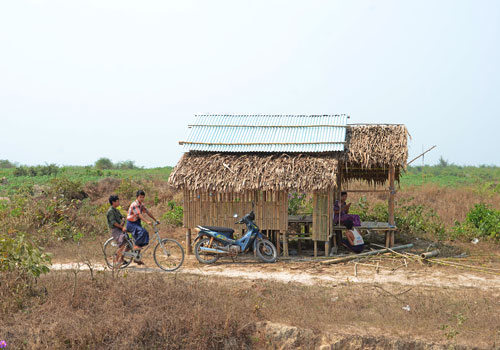 Scores of people are moving to a former rubber plantation in Kawhmu township, Yangon Region, attracted by the chance of owning their own land, while mystery surrounds the real ownership status of the plantation.
Scores of people are moving to a former rubber plantation in Kawhmu township, Yangon Region, attracted by the chance of owning their own land, while mystery surrounds the real ownership status of the plantation.
The Suukalat plantation emerged as a centre of controversy in 2013 when the large plot was awarded in a murky tender to Young Investment Group. Two months later, the son of the former owner tried to reclaim the land from the government which, he said, had seized it decades earlier.
The 1325-acre farm, comprising three plots of land, is now dotted with newly built bamboo houses. Even local residents are camping out to stake a claim on a plot of up to 2000 square feet. Ko Kyaw Lwin Aung, of Pyin Pin Ne village, Kawhmu township, said, “As the rumour spread, people began arriving, including some who already have homes in Kawhmu township. Before the rumour there were 20 households here. There are now more than 100.”
The rumour seems to have arisen after a ward administrator took the names of temporary residents, supposedly for land allocation purposes, last October.
“But nothing has happened since, except that more people turn up every day,” he added.
“More squatters started to arrive after administrators evicted 50 families from nearby grazing land to make way for a castor plant project. They relocated to Suukalat,” he said.
Enterprising individuals reportedly sold their sites to newer arrivals for as much as K60,000, despite having no title to the land, said Ko Kyaw Lwin Aung.
Ward administrator U Myo Myint Maung, of Shar Pwar village tract, which includes Suukalat, said Yangon Region government had offered to draw up a list of illegal residents in Suukalat last October.
“There were 400 then. In December, the authorities said they would allot 40,000 sq ft plots to each family living in Suukalat, providing they owned no other land. But no survey has yet been done,” he said, adding that 250 squatters had written to the regional government requesting the land in January.
“Before allocating any land, there has to be an investigation to make sure applicants own no other property,” he added. “There are a lot of fake squatters.”
“I’ve reported to higher-level authorities because I can’t do anything at my level. But I’ve had no reply,” he said, adding that the views of the owner of Suukalat would have to be taken into account.
The ownership of the farm is disputed. It was bought in 1957 from its British owners by a Mr Babulal, a Myanmar citizen of Indian origin, but the land was appropriated in 1968 under unclear circumstances by the Ne Win regime.
Mr Bablulal’s son, Ashok Kumar, tried to claim the land back in mid-2013. “My father never sought compensation because the government said its seizure of the land was only temporary,” he said, as reported by The Myanmar Times. Local residents have confirmed aspects of Mr Kumar’s account.
However, control of the land has passed from one government department to another. The latest “owner” is the Yangon Region government. The ownership dispute sharpened as the government launched a tender process for the sale of the property, which was cancelled amid widespread calls of foul play.
“My father planted rubber there, and so did all the Union government departments that controlled it. But Yangon Region government has left the land idle, and squatters have gathered there. Some of the rubber plants have been chopped down,” said Mr Kumar last week, though his manager who is handling the dispute. He is based in Bangkok.
“This is the second time officials have tried to sell my land,” said Mr Kumar, adding that his attempts to regain ownership were continuing, and that if necessary he would be willing to pay to see the land in his family’s possession once more.
U Kyaw Swar Htun who is living on the land said “I don’t own this land, but I can’t afford anywhere else. I’m ready to move if I have to.”
Daw Aye Aye Moe should she had been living illegally in Suukalat for two years. “At first I was glad when other squatters came, but now I’m worried action might be taken against all of us. Even though we’re squatting, at least we’re in our own houses. But the soil here is not good, so we can’t grow our own food. Transportation is poor, so it takes a long time to get into Kawhmu town,” she said.
Approached by The Myanmar Times, a spokesperson for Yangon Region government said it had no authority to determine the ownership of the land and declined to go into further detail.
Quoted from mmtimes.